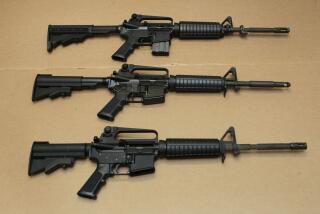Chabad victims, gun control group sue Smith & Wesson over San Diego synagogue shooting
The lawsuit says the company is negligent for designing and marketing the weapon used in the April 2019 shooting
- Share via
SAN DIEGO — A gun control organization has filed a lawsuit on behalf of victims of last year’s shooting at the Chabad of Poway synagogue, accusing the manufacturer of the weapon used in the fatal attack, the gun store that sold the weapon to the accused shooter and his parents of negligence.
The lawsuit filed by Brady Legal, the litigation arm of the gun control group Brady United, also names the state of California for failing to conduct an adequate background check that would have shown the accused shooter, John T. Earnest, was underage and not eligible to buy a weapon.
The suit was filed this week in San Diego Superior Court on behalf of Yisroel Goldstein, the now retired rabbi of the synagogue who was wounded in the April 27, 2019, attack and seven others who were present at the Passover services and suffered either physical or emotional injuries.
They include then-8-year-old Noya Dahan and her uncle Almog Peretz, both of whom were struck by shrapnel. The attack killed Lori Gilbert-Kaye, 60, who was shot twice in the back in the lobby of the synagogue.
The lawsuit contends that Smith & Wesson, the firearms company that manufactured the Model M&P 15 Sport II semiautomatic rifle used in the attack, is liable because it negligently designed the weapon so it could be easily modified to be fully automatic in violation of state law.
It also says the company consciously marketed the weapon so that it would appeal to “impulsive young men with military complexes who were particularly likely to be attracted to the unique ability of AR-15 style weapons.”
Earnest, facing murder, hate-crime and other charges in state and federal court, purchased the gun from San Diego Guns on Mission Gorge Road two weeks before the attack, authorities said. At the time he was 19 years old — too young to legally purchase the weapon under state law.
Earnest was able to exploit a state law that allows underage people with a hunting license to purchase guns. The license he used to purchase the gun, however, was not set to become active until July, the suit says.
The suit also blames both the state Department of Fish and Wildlife and the Department of Justice, the latter for not catching Earnest’s ineligibility for acquiring the gun during the mandatory 10-day background check.
Smith & Wesson did not respond to a request for comment Tuesday. The Department of Justice press office said it had not seen the lawsuit.
A man who answered the telephone at San Diego Guns also did not comment. “There is no one here who can talk to you about that,” he said.
Earnest, 20, has pleaded not guilty to all charges filed against him in state and federal court. The former nursing student is also charged with the arson of an Escondido mosque about a month before the shooting. Though the building was damaged, no one was hurt.
Authorities say Earnest wrote and posted online a lengthy, signed diatribe. The “manifesto” describes his hatred of Jews and Muslims, among other things. The posting was spotted before the shootings and forwarded to the FBI by a tipster, but too late for investigators to identify and stop the author.
The shootings were caught on security camera video, which showed a man identified by prosecutors as Earnest stepping into the synagogue doorway, raising a rifle and firing. Then he ran to his nearby car and drove off as an off-duty Border Patrol agent fired at him. Earnest called 911, told a dispatcher he had just fired on a synagogue, and surrendered without incident when authorities arrived.
The suit seeks monetary damages and an injunction against the gun company and gun store that would force them to change their business practices to avoid another shooting. Earnest and his parents are also named in the suit. The suit accuses the parents of negligence for allowing their son, who lived with them, to purchase the gun as well as other gear, and for not being aware of his violent tendencies.
A lawyer for the family did not respond to a request for comment.
Earnest would face the death penalty under state law if convicted. A decision on whether he would also face the death penalty under federal law has not yet been announced.
Moran writes for the San Diego Union-Tribune.
More to Read
Sign up for Essential California
The most important California stories and recommendations in your inbox every morning.
You may occasionally receive promotional content from the Los Angeles Times.














